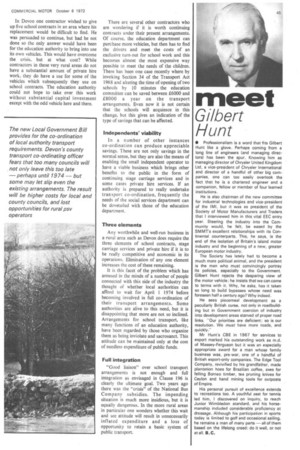meet
Page 47

If you've noticed an error in this article please click here to report it so we can fix it.
Gilbert Hunt
• Professionalism is a word that fits Gilbert Hunt like a glove. Perhaps coming from a long line of engineers (and managing directors) has been the spur. Knowing him as managing director of Chrysler United Kingdom Ltd, a vice-president of Chrysler International and director of a handful of other big companies, one can too easily overlook the fact that he is a chartered engineer and a companion, fellow or member of four learned institutions.
He is also chairman of the new committee for industrial technologies and vice-president of the IMI, but it was as president of the Society of Motor Manufacturers and Traders that I interviewed him in this vital EEC entry year. Steering the industry into the Cornmunity would, he felt, be eased by the SMMT's excellent relationships with its Continental counterparts. This, he says, is the end of the isolation of Britain's island motor industry and the beginning of a new, greater European motor industry.
The Society has lately had to become a much more political animal, and the president is the man who must convincingly portray its policies, especially to the Government. Gilbert Hunt rejects the desparing view of the motor vehicle; he insists that we can come to terms with it. Why, he asks, has it taken so long to build bypasses whose need was foreseen half a century ago? Why indeed.
He sees piecemeal development as a peculiarly British curse, not only in roadbuilding but in Government coercion of industry into development areas starved of proper road links. "Our priorities are deficient; so is our resolution. We must have more roads, and quickly."
Mr Hunt's CBE in 1967 for services to export marked his outstanding work as m.d. of Massey-Ferguson but it was an especially appropriate award for a man whose family business was, pre-war, one of a handful of British export-only companies. The Edge Tool Company, revivified by his grandfather, made plantation hoes for Brazilian coffee, axes for felling Borneo timber, tea pruning knives for Ceylon and hand mining tools for outposts of Empire.
His personal pursuit of excellence extends to recreations too. A youthful zest for tennis led him, I discovered on inquiry, to reach Junior Wimbledon standard, and his horsemanship included considerable proficiency at dressage. Although his participation in sports today is limited to golf and occasional sailing,
he remains a man of many parts all of them based on the lifelong creed: do it well, or not at all. B.C.






































































































